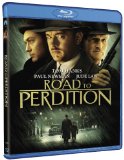| Reviews & Columns |
|
Reviews DVD TV on DVD Blu-ray 4K UHD International DVDs In Theaters Reviews by Studio Video Games Features Collector Series DVDs Easter Egg Database Interviews DVD Talk Radio Feature Articles Columns Anime Talk DVD Savant Horror DVDs The M.O.D. Squad Art House HD Talk Silent DVD
|
DVD Talk Forum |
|
|
| Resources |
|
DVD Price Search Customer Service #'s RCE Info Links |
|
Columns
|
|
|
Road to Perdition
Dreamworks // R // August 3, 2010
List Price: $29.99 [Buy now and save at Amazon]
The Film:
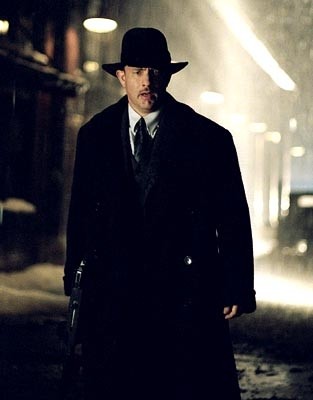 After Sam Mendes' heavily-lauded success with his debut feature American Beauty, a visually-inventive drama that wrestles with the psychology of domestic life, it'd comes as a bit of a surprise that he'd follow it up with a Great Depression-era gangster film. Thankfully, that's not what Road to Perdition is really about. Adapted from a graphic novel by Max Allan Collins, this story doesn't rely on cunning gunplay, testosterone-driven posturing, or any semblance of glorification for organized crime. Instead, this sophomore effort from Mendes focuses again on a similar family-centered core as a father and son cope with tragedy, painted against a dangerous backdrop as honor's complexity swarms about them. Beautifully shot, elegantly scored, and carrying one of Tom Hanks' signature subtle performances, it's a distinctly graceful piece of filmmaking that savors its interactions among complicated characters.
After Sam Mendes' heavily-lauded success with his debut feature American Beauty, a visually-inventive drama that wrestles with the psychology of domestic life, it'd comes as a bit of a surprise that he'd follow it up with a Great Depression-era gangster film. Thankfully, that's not what Road to Perdition is really about. Adapted from a graphic novel by Max Allan Collins, this story doesn't rely on cunning gunplay, testosterone-driven posturing, or any semblance of glorification for organized crime. Instead, this sophomore effort from Mendes focuses again on a similar family-centered core as a father and son cope with tragedy, painted against a dangerous backdrop as honor's complexity swarms about them. Beautifully shot, elegantly scored, and carrying one of Tom Hanks' signature subtle performances, it's a distinctly graceful piece of filmmaking that savors its interactions among complicated characters.
Front and center being Michael Sullivan (Hanks), the "enforcer" to aging mob boss John Rooney (Paul Newman). He has a wife (Jennifer Jason-Leigh) and two kids, Peter (Liam Aiken) and Michael (Tyler Hoechlin), who have grown up around the lifestyle without any awareness of what their father does when he leaves the house in the darkest hours of the night. Michael, a curious lad, decides to stow away in the storage compartment of his dad's car one night, and what he sees -- a slurry of bullets from his father's Tommy gun involving people he's interacted with, caused by a knee-jerk reaction from Rooney's son Connor (Daniel Craig) -- changes everything in their lives. At this point, the situation escalates into something typical of a mob witness case, sending Sullivan and his son in a mad scramble to save their lives before a macabre hit man (Jude Law) with a penchant for photographing the dead catches up to them.
Mendes spreads a similar aesthetic look from American Beauty over to Road to Perdition, obviously with less emphasis on blistering, bright colors and overtly idyllic scoring. Cinematographer Conrad Hall captures an earthy beauty out of the Depression-era period, using lush browns and greens to emphasize a rich, vaguely welcoming atmosphere about both the Rooney household and the slightly cooler Sullivan house. Darkness becomes prominent as the story grows threatening and gloomy, covering silhouettes of gangsters in gentle lighting that makes them more menacing and officious than mere men -- striking an unusual but provocative balance between the story's intimacy and our perception of the film's peril. Aligned with that, composer Thomas Newman batches together similar bouncy, flighty notes between his work on Mendes' freshman film and The Green Mile for a sumptuous, memorable musical experience.
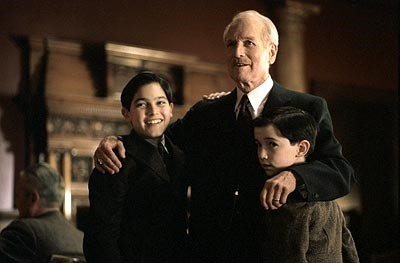 At the surface, Road to Perdition might sound conventional, or even narrowly focused. Protecting one's family after they witness incriminating activity -- especially murder -- is a common occurrence in mobster films, along with the violent, entitled rage of the boss' son towards a position of power. Though these are central plot elements, they're not where Mendes' film finds its center; in its place, the focus gravitates around the fabric of honor and fatherhood, illustrating how death and corruption as sins of the father, and the lack thereof, can shape the child. They become clear as Sullivan teaches his son how to drive a stick-shift vehicle under unique circumstances and inquires about his favorite school subjects, all after the fact. The film becomes a portrait of the immediacy of moments, ones made pressing by the threats of an organization that has, up until this point, treated the Sullivans like a second family.
At the surface, Road to Perdition might sound conventional, or even narrowly focused. Protecting one's family after they witness incriminating activity -- especially murder -- is a common occurrence in mobster films, along with the violent, entitled rage of the boss' son towards a position of power. Though these are central plot elements, they're not where Mendes' film finds its center; in its place, the focus gravitates around the fabric of honor and fatherhood, illustrating how death and corruption as sins of the father, and the lack thereof, can shape the child. They become clear as Sullivan teaches his son how to drive a stick-shift vehicle under unique circumstances and inquires about his favorite school subjects, all after the fact. The film becomes a portrait of the immediacy of moments, ones made pressing by the threats of an organization that has, up until this point, treated the Sullivans like a second family.
What's absorbing about Sam Mendes' adaptation is its ability to utilize familiar templates for characters, and then turn them into unique, gray-area entities, paramount of course being Hanks' Michael Sullivan. The knee-jerk reaction when someone thinks about the violent right-arm of a mob boss is someone who's a razor-sharp, heavily skilled assassin of sorts, whereas Sullivan stands as little more than a regular Joe efficiently doing the bidding of his employer with a machine gun. He's not a clean, perfect killer, but a man who grew up under the umbrella of organized crime. With that in mind, his actions and reactions in Road to Perdition captivate with their potency, from the way he sternly speaks with his son after he witnesses the killing to the way he navigates about the scattering of fire fights in the film. With Hanks' subtlety of facial emotion running at a cool, calculated high here, it's difficult not to be gripped by his presence.
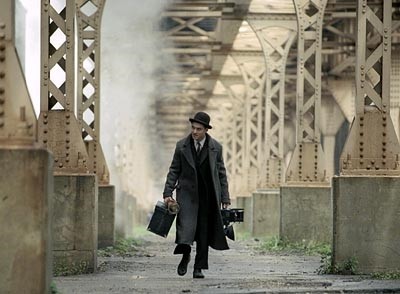 This "humanization" of sorts in Road to Perdition carries over into the rest of the Rooney organization, especially potent in the leader himself and his son. Again, stating that a mob boss has hired a killer to hunt down one of his employees sounds cold-blooded, especially when it's because of the follies caused by his son, but both the direction and the scripting at play here staunchly veer from conventional archetypes. It's made obvious that the simple, brunt enforcer is like a son to Rooney, something Connor doesn't favor, and watching the family that Sullivan's built around this life come closing in on him transforms into a surprisingly intimate experience. Most of this happens by way of a typically controlled performance late in Paul Newman's career, as he gives nuance to John Rooney's actions that deftly communicate a paternal care for Sullivan. Daniel Craig's also quite good as Connor in an early role, with just the right mix of bratty anger and misguided ambition to take him beyond being one-dimensional.
This "humanization" of sorts in Road to Perdition carries over into the rest of the Rooney organization, especially potent in the leader himself and his son. Again, stating that a mob boss has hired a killer to hunt down one of his employees sounds cold-blooded, especially when it's because of the follies caused by his son, but both the direction and the scripting at play here staunchly veer from conventional archetypes. It's made obvious that the simple, brunt enforcer is like a son to Rooney, something Connor doesn't favor, and watching the family that Sullivan's built around this life come closing in on him transforms into a surprisingly intimate experience. Most of this happens by way of a typically controlled performance late in Paul Newman's career, as he gives nuance to John Rooney's actions that deftly communicate a paternal care for Sullivan. Daniel Craig's also quite good as Connor in an early role, with just the right mix of bratty anger and misguided ambition to take him beyond being one-dimensional.
As the host of relationships complicate around the Rooney underbelly and the film barrels along with emotional growth and an impending sense of dread for the Sullivan duo, Road to Perdition moves along with a more dramatic keel than suspenseful. Mendes concentrates on allowing the father-son bond to gel between Michael and his son, which takes us down a convincing path towards catharsis for the once-violent enforcer that's touching on a level that sidesteps maudlin theatrics. Tones of retribution, reverence, and even a complex level of regret swell around their trip towards Perdition, where the young Sullivan boy can, hopefully, find a place with family to be safe from the gunfire. And, once it boils into a pastiche of gorgeous yet violent images at its close -- including one superbly-crafted sequence near the end that takes place in Mendes' familiar rainfall setting, and another involving Jude Law's sparsely-used but edgy villain Harlen Maguire -- it transforms into a heartbreaking picture of both technical and poignant prowess that intensifies upon repeat viewings.
The Blu-ray:
Video and Audio:
Aside from a few speedbumps, the crew at Paramount has positioned itself as one of the better high-definition catalog studios -- chalking up supremely satisfying efforts with the one-two punch of Collateral and Minority Report, along with the satisfying release for Braveheart in their Sapphire Series. This trend continues with Road to Perdition, encapsulated in a 2.35:1 AVC encode that preserves the theatrical look of the film with aplomb. It really can't be said much better than Sam Mendes in the introduction for the film in cluded on this Blu-ray, where he discusses legendary cinemographer Conrad Hall's exquisite work on the film and the ability to see every raindrop during a pivotal scene late in the film. And he's right: this effort from Paramount retains a glorious, appropriately cinematic look to a splendidly photographed picture.
The first thing you'll notice in the cinematography is an exquisite range of browns and greens, fluctuating through a deep palette that evokes a sense of brooding energy. Hall's cinematography operates on a wide range of contrast usage, and "rich" can certainly describe the high-definition color replication here. Black and profound browns stay exquisitely stable, void of unsightly digital noise at any point. A few examples of fine detail crop up against the period clothing and some of the interior architecture, as well as a few shots of the semi-dilapidated farm house later in the film, while the wealth of detail and naturalness in skin tones impress. If there's anything that drags the presentation there, it's a few glimpses of speckles and print damage that surface more frequently than I'd like. Other than that, this presentation of Road to Perdition retains a stability and classiness that's absolutely beautiful.
Audio arrives in an excellent DTS HD Master Audio track. For some reason, I always forget that Road to Perdition excels in sound execution, combining strategically potent ambient effects with Thomas Newman's scoring. Delicate elements like the fluttering of rainfall, the flick of a lighter, and the echo of a gunshot resonate greatly in the sound design, and it's always sounded brilliant on a home theater. With the DTS DVD available for comparison, these elements leap out from the Master Audio track with an impressive leap in breadth, as the percussion and wind instruments from the scoring, the pitter-patter of rainfall, and the way sounds like footsteps and voices echo against walls exhibiting a surprising boost in clarity. And, naturally, gunfire bolsters forward with much more chest-pounding strength, while also allowing sound elements like the falling of shells to ring much truer. It's an impressive leap forward in an engagingly aural film, one Paramount should be proud of. French and Spanish 5.1 Dolby Digital tracks are also included, along with English, English SDH, French and Spanish subtitles.
Special Features:
 The Library: A Further Exploration of the world of Road to Perdition:
The Library: A Further Exploration of the world of Road to Perdition:
Probably the paramount reason to pick up the Blu-ray from a supplemental viewpoint, this collage of both textual and interview footage dives into several assorted topics revolving around the construction of Road to Perdition -- both as a film and as a graphic novel. Writer Max Allen Collins, artist Richard Piers Rayner, and Sam Mendes offer in-depth explanations behind the roots of the film's elements. They discuss Sullivan as the "third thug from the left" in one portion, while also detailing the reality behind an unnamed crime-scene photographer from the '30s that Jude Law's character was based on. Sketches from the graphic novel, a few blueprints, and stills from the film accompany the material, segmented into Crime Scene Portraits, Real World Organized Crime, News Stories of the Day, and Inspiration and Adaptation.
A Cinematic Life: The Art and Influence of Conrad Hall (26:39, HD AVC):
A retrospective on the life of the famed cinematographer, this piece features interviews with former cast members and his son, cinematographer Conrad W. Hall from Panic Room, talking about his life in Hollywood. Discussion falls on Hall's author father and his early contemplation in journalism, then ratcheting through black-and-white cinematography to his color work. Cinematographers Janusz Kaminski of Schindler's List, Vilmos Zsigmond of Close Encounters of the Third Kind, and Roger Deakins of Revolutionary Road all offer comments on Conrad Hall's composition, use of lighting, and how he even shot his color films with a black-and-white visage in mind.
Also carried over from the standard-definition DVDs from 2003, we've got an involving Commentary with Sam Mendes that shows his enthusiasm for his projects and his eye for visual storytelling, and a Making of Road to Perdition (25:04, SD MPEG-2; only on Dolby Digital DVD, not DTS) piece that follows a more familiar, step-by-step tone with interviews from Hanks, Mendes, and others for a piece shot for HBO. Rounding things out, Paramount have also included the Deleted Scenes (22:16, SD MPEG-2) from the DVD featuring audio commentary with Mendes, and an interesting Theatrical Trailer (2:52, HD AVC) that shows what Road to Perdition might've looked like if the film's cinematography hadn't been given the concentration it receives in the actual HD film transfer.
Final Thoughts:
Road to Perdition is, for some reason, a film that's evaded too many repeat viewings in this reviewer's eyes, possibly for the dark turns that the film takes in the 11th hour. However, as soon as Conrad Hall's cinematography begins painting a picture, Thomas Newman's scoring echoes, and Hanks' controlled performance begins gruffly rumbling along as he unloads his gun with his son watching at the beginning, I can never remember why I wouldn't want to return. It's impossible to not become engrossed in Sam Mendes' adaptation of the graphic novel of the same name, a gorgeous picture, both for its construction and its emotional rooting, that takes somewhat familiar story elements of Depression-era gangster films and transforms them into visual poetry. Paramount has, once again, delivered another Highly Recommended catalog release here that delivers a terrific film-like presentation of an exquisitely-handled picture.
Thomas Spurlin, Staff Reviewer -- DVDTalk Reviews | Personal Blog/Site
 After Sam Mendes' heavily-lauded success with his debut feature American Beauty, a visually-inventive drama that wrestles with the psychology of domestic life, it'd comes as a bit of a surprise that he'd follow it up with a Great Depression-era gangster film. Thankfully, that's not what Road to Perdition is really about. Adapted from a graphic novel by Max Allan Collins, this story doesn't rely on cunning gunplay, testosterone-driven posturing, or any semblance of glorification for organized crime. Instead, this sophomore effort from Mendes focuses again on a similar family-centered core as a father and son cope with tragedy, painted against a dangerous backdrop as honor's complexity swarms about them. Beautifully shot, elegantly scored, and carrying one of Tom Hanks' signature subtle performances, it's a distinctly graceful piece of filmmaking that savors its interactions among complicated characters.
After Sam Mendes' heavily-lauded success with his debut feature American Beauty, a visually-inventive drama that wrestles with the psychology of domestic life, it'd comes as a bit of a surprise that he'd follow it up with a Great Depression-era gangster film. Thankfully, that's not what Road to Perdition is really about. Adapted from a graphic novel by Max Allan Collins, this story doesn't rely on cunning gunplay, testosterone-driven posturing, or any semblance of glorification for organized crime. Instead, this sophomore effort from Mendes focuses again on a similar family-centered core as a father and son cope with tragedy, painted against a dangerous backdrop as honor's complexity swarms about them. Beautifully shot, elegantly scored, and carrying one of Tom Hanks' signature subtle performances, it's a distinctly graceful piece of filmmaking that savors its interactions among complicated characters. Front and center being Michael Sullivan (Hanks), the "enforcer" to aging mob boss John Rooney (Paul Newman). He has a wife (Jennifer Jason-Leigh) and two kids, Peter (Liam Aiken) and Michael (Tyler Hoechlin), who have grown up around the lifestyle without any awareness of what their father does when he leaves the house in the darkest hours of the night. Michael, a curious lad, decides to stow away in the storage compartment of his dad's car one night, and what he sees -- a slurry of bullets from his father's Tommy gun involving people he's interacted with, caused by a knee-jerk reaction from Rooney's son Connor (Daniel Craig) -- changes everything in their lives. At this point, the situation escalates into something typical of a mob witness case, sending Sullivan and his son in a mad scramble to save their lives before a macabre hit man (Jude Law) with a penchant for photographing the dead catches up to them.
Mendes spreads a similar aesthetic look from American Beauty over to Road to Perdition, obviously with less emphasis on blistering, bright colors and overtly idyllic scoring. Cinematographer Conrad Hall captures an earthy beauty out of the Depression-era period, using lush browns and greens to emphasize a rich, vaguely welcoming atmosphere about both the Rooney household and the slightly cooler Sullivan house. Darkness becomes prominent as the story grows threatening and gloomy, covering silhouettes of gangsters in gentle lighting that makes them more menacing and officious than mere men -- striking an unusual but provocative balance between the story's intimacy and our perception of the film's peril. Aligned with that, composer Thomas Newman batches together similar bouncy, flighty notes between his work on Mendes' freshman film and The Green Mile for a sumptuous, memorable musical experience.
 At the surface, Road to Perdition might sound conventional, or even narrowly focused. Protecting one's family after they witness incriminating activity -- especially murder -- is a common occurrence in mobster films, along with the violent, entitled rage of the boss' son towards a position of power. Though these are central plot elements, they're not where Mendes' film finds its center; in its place, the focus gravitates around the fabric of honor and fatherhood, illustrating how death and corruption as sins of the father, and the lack thereof, can shape the child. They become clear as Sullivan teaches his son how to drive a stick-shift vehicle under unique circumstances and inquires about his favorite school subjects, all after the fact. The film becomes a portrait of the immediacy of moments, ones made pressing by the threats of an organization that has, up until this point, treated the Sullivans like a second family.
At the surface, Road to Perdition might sound conventional, or even narrowly focused. Protecting one's family after they witness incriminating activity -- especially murder -- is a common occurrence in mobster films, along with the violent, entitled rage of the boss' son towards a position of power. Though these are central plot elements, they're not where Mendes' film finds its center; in its place, the focus gravitates around the fabric of honor and fatherhood, illustrating how death and corruption as sins of the father, and the lack thereof, can shape the child. They become clear as Sullivan teaches his son how to drive a stick-shift vehicle under unique circumstances and inquires about his favorite school subjects, all after the fact. The film becomes a portrait of the immediacy of moments, ones made pressing by the threats of an organization that has, up until this point, treated the Sullivans like a second family. What's absorbing about Sam Mendes' adaptation is its ability to utilize familiar templates for characters, and then turn them into unique, gray-area entities, paramount of course being Hanks' Michael Sullivan. The knee-jerk reaction when someone thinks about the violent right-arm of a mob boss is someone who's a razor-sharp, heavily skilled assassin of sorts, whereas Sullivan stands as little more than a regular Joe efficiently doing the bidding of his employer with a machine gun. He's not a clean, perfect killer, but a man who grew up under the umbrella of organized crime. With that in mind, his actions and reactions in Road to Perdition captivate with their potency, from the way he sternly speaks with his son after he witnesses the killing to the way he navigates about the scattering of fire fights in the film. With Hanks' subtlety of facial emotion running at a cool, calculated high here, it's difficult not to be gripped by his presence.
 This "humanization" of sorts in Road to Perdition carries over into the rest of the Rooney organization, especially potent in the leader himself and his son. Again, stating that a mob boss has hired a killer to hunt down one of his employees sounds cold-blooded, especially when it's because of the follies caused by his son, but both the direction and the scripting at play here staunchly veer from conventional archetypes. It's made obvious that the simple, brunt enforcer is like a son to Rooney, something Connor doesn't favor, and watching the family that Sullivan's built around this life come closing in on him transforms into a surprisingly intimate experience. Most of this happens by way of a typically controlled performance late in Paul Newman's career, as he gives nuance to John Rooney's actions that deftly communicate a paternal care for Sullivan. Daniel Craig's also quite good as Connor in an early role, with just the right mix of bratty anger and misguided ambition to take him beyond being one-dimensional.
This "humanization" of sorts in Road to Perdition carries over into the rest of the Rooney organization, especially potent in the leader himself and his son. Again, stating that a mob boss has hired a killer to hunt down one of his employees sounds cold-blooded, especially when it's because of the follies caused by his son, but both the direction and the scripting at play here staunchly veer from conventional archetypes. It's made obvious that the simple, brunt enforcer is like a son to Rooney, something Connor doesn't favor, and watching the family that Sullivan's built around this life come closing in on him transforms into a surprisingly intimate experience. Most of this happens by way of a typically controlled performance late in Paul Newman's career, as he gives nuance to John Rooney's actions that deftly communicate a paternal care for Sullivan. Daniel Craig's also quite good as Connor in an early role, with just the right mix of bratty anger and misguided ambition to take him beyond being one-dimensional. As the host of relationships complicate around the Rooney underbelly and the film barrels along with emotional growth and an impending sense of dread for the Sullivan duo, Road to Perdition moves along with a more dramatic keel than suspenseful. Mendes concentrates on allowing the father-son bond to gel between Michael and his son, which takes us down a convincing path towards catharsis for the once-violent enforcer that's touching on a level that sidesteps maudlin theatrics. Tones of retribution, reverence, and even a complex level of regret swell around their trip towards Perdition, where the young Sullivan boy can, hopefully, find a place with family to be safe from the gunfire. And, once it boils into a pastiche of gorgeous yet violent images at its close -- including one superbly-crafted sequence near the end that takes place in Mendes' familiar rainfall setting, and another involving Jude Law's sparsely-used but edgy villain Harlen Maguire -- it transforms into a heartbreaking picture of both technical and poignant prowess that intensifies upon repeat viewings.
The Blu-ray:
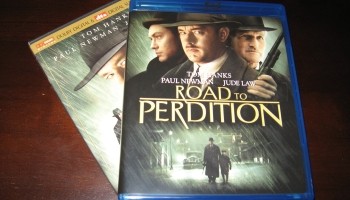 | 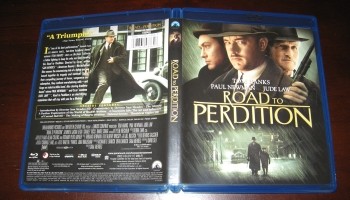 |
Video and Audio:
Aside from a few speedbumps, the crew at Paramount has positioned itself as one of the better high-definition catalog studios -- chalking up supremely satisfying efforts with the one-two punch of Collateral and Minority Report, along with the satisfying release for Braveheart in their Sapphire Series. This trend continues with Road to Perdition, encapsulated in a 2.35:1 AVC encode that preserves the theatrical look of the film with aplomb. It really can't be said much better than Sam Mendes in the introduction for the film in cluded on this Blu-ray, where he discusses legendary cinemographer Conrad Hall's exquisite work on the film and the ability to see every raindrop during a pivotal scene late in the film. And he's right: this effort from Paramount retains a glorious, appropriately cinematic look to a splendidly photographed picture.
The first thing you'll notice in the cinematography is an exquisite range of browns and greens, fluctuating through a deep palette that evokes a sense of brooding energy. Hall's cinematography operates on a wide range of contrast usage, and "rich" can certainly describe the high-definition color replication here. Black and profound browns stay exquisitely stable, void of unsightly digital noise at any point. A few examples of fine detail crop up against the period clothing and some of the interior architecture, as well as a few shots of the semi-dilapidated farm house later in the film, while the wealth of detail and naturalness in skin tones impress. If there's anything that drags the presentation there, it's a few glimpses of speckles and print damage that surface more frequently than I'd like. Other than that, this presentation of Road to Perdition retains a stability and classiness that's absolutely beautiful.
Audio arrives in an excellent DTS HD Master Audio track. For some reason, I always forget that Road to Perdition excels in sound execution, combining strategically potent ambient effects with Thomas Newman's scoring. Delicate elements like the fluttering of rainfall, the flick of a lighter, and the echo of a gunshot resonate greatly in the sound design, and it's always sounded brilliant on a home theater. With the DTS DVD available for comparison, these elements leap out from the Master Audio track with an impressive leap in breadth, as the percussion and wind instruments from the scoring, the pitter-patter of rainfall, and the way sounds like footsteps and voices echo against walls exhibiting a surprising boost in clarity. And, naturally, gunfire bolsters forward with much more chest-pounding strength, while also allowing sound elements like the falling of shells to ring much truer. It's an impressive leap forward in an engagingly aural film, one Paramount should be proud of. French and Spanish 5.1 Dolby Digital tracks are also included, along with English, English SDH, French and Spanish subtitles.
Special Features:
 The Library: A Further Exploration of the world of Road to Perdition:
The Library: A Further Exploration of the world of Road to Perdition: Probably the paramount reason to pick up the Blu-ray from a supplemental viewpoint, this collage of both textual and interview footage dives into several assorted topics revolving around the construction of Road to Perdition -- both as a film and as a graphic novel. Writer Max Allen Collins, artist Richard Piers Rayner, and Sam Mendes offer in-depth explanations behind the roots of the film's elements. They discuss Sullivan as the "third thug from the left" in one portion, while also detailing the reality behind an unnamed crime-scene photographer from the '30s that Jude Law's character was based on. Sketches from the graphic novel, a few blueprints, and stills from the film accompany the material, segmented into Crime Scene Portraits, Real World Organized Crime, News Stories of the Day, and Inspiration and Adaptation.
A Cinematic Life: The Art and Influence of Conrad Hall (26:39, HD AVC):
A retrospective on the life of the famed cinematographer, this piece features interviews with former cast members and his son, cinematographer Conrad W. Hall from Panic Room, talking about his life in Hollywood. Discussion falls on Hall's author father and his early contemplation in journalism, then ratcheting through black-and-white cinematography to his color work. Cinematographers Janusz Kaminski of Schindler's List, Vilmos Zsigmond of Close Encounters of the Third Kind, and Roger Deakins of Revolutionary Road all offer comments on Conrad Hall's composition, use of lighting, and how he even shot his color films with a black-and-white visage in mind.
Also carried over from the standard-definition DVDs from 2003, we've got an involving Commentary with Sam Mendes that shows his enthusiasm for his projects and his eye for visual storytelling, and a Making of Road to Perdition (25:04, SD MPEG-2; only on Dolby Digital DVD, not DTS) piece that follows a more familiar, step-by-step tone with interviews from Hanks, Mendes, and others for a piece shot for HBO. Rounding things out, Paramount have also included the Deleted Scenes (22:16, SD MPEG-2) from the DVD featuring audio commentary with Mendes, and an interesting Theatrical Trailer (2:52, HD AVC) that shows what Road to Perdition might've looked like if the film's cinematography hadn't been given the concentration it receives in the actual HD film transfer.
Final Thoughts:
Road to Perdition is, for some reason, a film that's evaded too many repeat viewings in this reviewer's eyes, possibly for the dark turns that the film takes in the 11th hour. However, as soon as Conrad Hall's cinematography begins painting a picture, Thomas Newman's scoring echoes, and Hanks' controlled performance begins gruffly rumbling along as he unloads his gun with his son watching at the beginning, I can never remember why I wouldn't want to return. It's impossible to not become engrossed in Sam Mendes' adaptation of the graphic novel of the same name, a gorgeous picture, both for its construction and its emotional rooting, that takes somewhat familiar story elements of Depression-era gangster films and transforms them into visual poetry. Paramount has, once again, delivered another Highly Recommended catalog release here that delivers a terrific film-like presentation of an exquisitely-handled picture.
|
| Popular Reviews |
| Sponsored Links |
|
|
| Sponsored Links |
|
|
| Release List | Reviews | Shop | Newsletter | Forum | DVD Giveaways | Blu-Ray | Advertise |
|
Copyright 2024 DVDTalk.com All Rights Reserved. Legal Info, Privacy Policy, Terms of Use,
Manage Preferences,
Your Privacy Choices | |||||||









